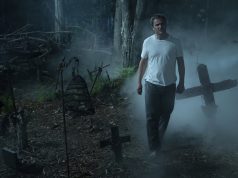
True to its title, “The Wait” (“L’attesa”) is about people waiting for others to arrive or return, and it begins with an image of one of history’s most eagerly anticipated figures: Jesus Christ, in the form of a large crucifix displayed in a Sicilian church where a funeral is being held. Easter is just days away, so death and resurrection are already on the minds of the mourners in this very Catholic country.
Slowly, dreamily, first-time director Piero Messina moves the camera to reveal not who’s in the casket but who’s standing off to the side, dazed, clearly the mourner who has suffered the greatest loss. She is Anna (Juliette Binoche), a Frenchwoman who married (and eventually divorced) a Sicilian man and has an adult son named Giuseppe. Not long after the funeral, the mirrors still covered in black cloth and Anna still near-catatonic with grief, she receives a guest: Jeanne (Lou de Laâge), Giuseppe’s girlfriend, arriving for a pre-arranged visit. But where, Jeanne wants to know, is Giuseppe?
Tender and subdued, this is the kind of movie that doesn’t spell things out, using silence, well-placed music, and Juliette Binoche’s wonderful face to convey emotion. This reticence is what fuels the story, actually: if the characters were blunt with each other and didn’t tolerate enigmatic or incomplete answers, the film would be over in 20 minutes. It’s not quite what Roger Ebert used to call an Idiot Plot, https://en.wikipedia.org/wiki/Idiot_plot but it may be a stumbling-block for viewers unless they go in prepared to accept it.) Instead, Anna says that her brother has just died, and that Giuseppe will be back in time for Easter. (She doesn’t say how these two facts, if they are facts, are related.) Jeanne, perceiving that Anna is out of sorts but not wanting to press the issue, accepts the answer, or forces herself to pretend to accept it. Now the two women have some time to get to know each other.
We pick up a few details about Jeanne and Giuseppe’s history together: that they had a temporary falling-out last summer, that they hadn’t seen each other in several weeks when he invited her to make this visit. Lou de Laâge, a winsome French actress who has not yet appeared much on American movie screens, has an open, expressive face that brings light and cheer to Anna’s forlorn household. She both contrasts and complements Binoche’s wounded, care-worn performance, itself a masterpiece of understatement. And Messina, who worked as an assistant director to Paolo Sorrentino (“The Great Beauty”), directs the melancholic story with artful delicacy, turning sorrow and pity into something sublime, right down to the heartbreaking final shot.
B+ (1 hr., 40 min.; Italian and French with subtitles; )





